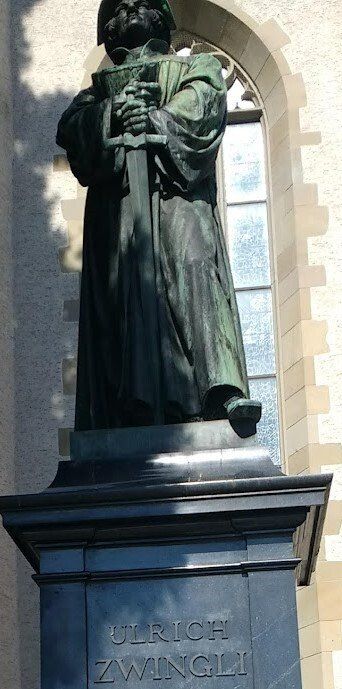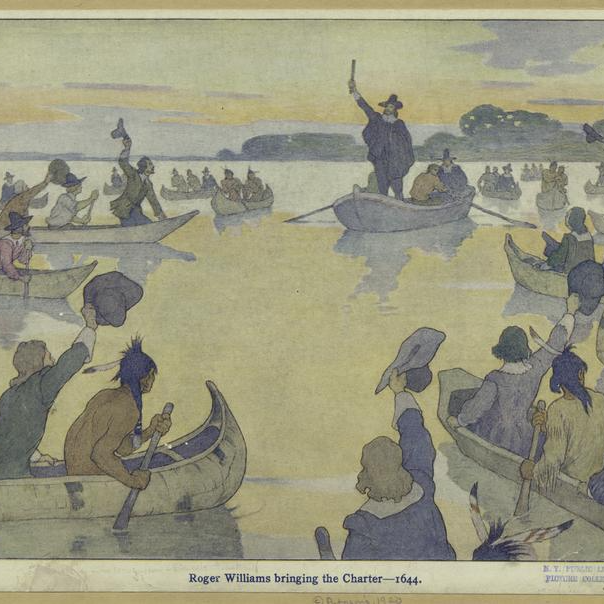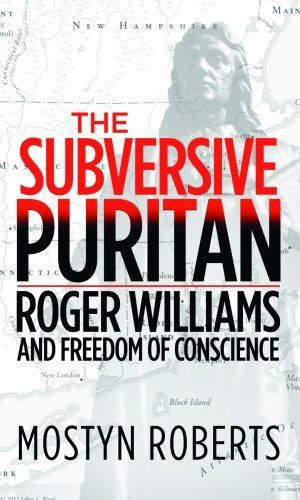Democracy's Christian roots ... a very short introduction
Zurich, Switzerland - the story in four sites

Charlemagne, founder of the Holy Roman Empire


Ulrich Zwingli
Around 800 AD, Charlemagne founded the Holy Roman Empire. The statue on the left is in Zurich's Grossmunster - headquarters, 700 years later, of the Swiss Reformation led by Pastor Ulrich Zwingli. Under the theory of 'two swords', church and state worked together to enforce God's rule through one church to which citizens all must belong. At first the Protestant Reformers took over this model. But the 'Anabaptists' rejected this, insisting that the New Testament tells believers to form self-governing churches. A memorial (below) to Felix Manz and other Baptists marks where their death sentence was carried out by drowning.

Memorial to murdered Anabaptists, Zurich
Engraving by Jan Luiken showing the 1637 arrest of Anabaptists in Zurich
The English civil war opened the way for Anabaptists to propose freedom of religion
The Anabaptists spread their message across Europe. They held from the bible that
- The church consists only of believers who follow Jesus as Lord;
- A person may be baptised only when ready to decide that she or he wishes to make this public commitment;
- The state has no authority in matters of religion, and
- The local gathering of true believers is the only body with authority to manage its own business including admitting members and appointing teachers and leaders
Anabaptists challenged the prevailing idea that, to keep order, the state must decide on the religion to be followed by all subjects. Persecuted, exiled and killed in large number, Anabaptists laid the foundations both for the modern independent church and modern democracy.
My article, published in Anabaptism Today in 2019, looks at how this played out in England.
Roger Williams, returning to Providence from London in 1644, holds up the Rhode Island Patent of 1643-44. By E. Boyd Smith (1860-1943) (New York Public Library)
The first modern democracy was based on unlimited freedom of religion
The form of government established … is Democratical, that is to say, a government held by the free and voluntary consent of all, or the greater part of the free inhabitants’
- code of laws adopted by Providence Plantations, 1647
The American colony known as Rhode Island was formed to protect full freedom of religion. It was a haven for those persecuted by the government of Massachusetts, including Anabaptists and Quakers. Its founder, Roger Williams, got clearance from England’s Parliament to form the new colony, with its own government, in 1644.
Before leaving England to return to Providence with this ‘patent’, Roger Williams released The Bloudy Tenent of Persecution for Cause of Conscience.
Roger Williams' key arguments became the foundation for the Rhode Island democracy. They were also a vital influence on developments in the English civil war:
- the state’s legitimacy comes from the consent of the citizens.
- God wills complete freedom for all – including ‘Paganish, Jewish, Turkish or anti-Christian consciences and worships’.
In his own day, Williams's ideas were considered wild. Later, after the Revolution and the foundation of the United States, religious freedom and the separation of church and state became basic principles of the new land's democracy. Williams reached a peak of popularity in the USA in the nineteenth century. The painting (above, left) imagining Williams returning to Providence with his patent is from this period.
But Roger Williams was a devoted Puritan Christian.
Today's religious right prefers to ignore his contribution, admiring instead the Theocrats who wanted America to be a ‘new Israel’ and threw Williams (who strongly disagreed) out of Massachusetts.
The Subversive Puritan by the evangelical minister Mostyn Roberts is the first biography of Williams to be produced by a Brit.



